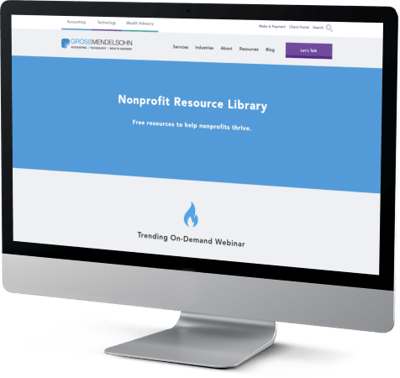When the Tax Cuts and Jobs Act (TCJA) was passed in late 2017, nonprofits across the country had one big question — how does this affect us as an organization?
Here is a quick overview of the four key changes that nonprofits should look out for under the TCJA.
Charitable Contributions Might Decrease
The standard deduction for individual taxpayers has doubled under the TCJA, making the standard deduction $12,000 (filing single) and $24,000 (filing jointly). That means fewer people will be itemizing their deductions on their tax return and, as a result, will no longer receive a benefit from their charitable contributions.
Because fewer individuals will benefit from making charitable contributions, annual giving may go down. In fact, the Tax Policy Center projects that the number of charitable dollars donated in 2018 will be cut by 33% as a result of the TCJA. This will make comprehensive fundraising all the more important.
Excise Tax for Highly Compensated Employees
Under the TCJA, nonprofits are subject to a 21% excise tax for “covered” employees who are paid over $1 million. A covered employee is defined as any current or former employee who is one of the top five highest compensated employees at the organization or was a covered employee of the organization (even if they no longer work for you) for any year after 2016.
Changes to Unrelated Business Income of Tax-exempt Organizations
For an activity to be classified as unrelated business income (UBI) and subject to UBI tax, the IRS stipulates the activity must meet the following requirements:
-
It is a trade or business,
-
It is regularly carried on and
- It is not substantially related to furthering the exempt purpose of the organization
This can include exceptions, like for volunteer labor or the sale of donated merchandise. However, under the TCJA, certain fringe benefits paid, such as an employee’s commuting expenses or parking, will now be converted to income, which the organization must pay a 21% excise tax on. This is to encourage equality between for-profit and tax-exempt organizations.
The organization is subject to the excise tax regardless of whether the nonprofit pays for the expense outright or if it allows an employee to use a cafeteria plan to take out the amount pre-tax. This is because in both scenarios a benefit is being received for a no longer deductible fringe benefit. The tax would need to be paid through the IRS EFTPS system.
If your nonprofit determines that you are subject to the tax, you should consider starting to make estimated tax payments for 2018. Additionally, depending on how your state conforms to the new federal laws there may be a state tax requirement as well.
Changes to Documentation of Unrelated Business Income Activities
Unlike the past, under the TCJA, all unrelated business income (UBI) activities for nonprofits must be accounted for separately and losses from one activity cannot be used to offset income from another activity. Prior to the TCJA, all of a tax-exempt organization’s UBI activities were grouped together, and if one activity had income and the other activity had losses, they offset each other. However, this is no longer the case. Under the TCJA, if one unrelated activity has income and another unrelated activity has a loss, the nonprofit can’t use the loss from an activity to offset the income of another activity, meaning they will pay tax on the income.
Need Help?
It’s a good idea to work with your tax advisor to thoroughly analyze how your nonprofit will be impacted by the TCJA and to make a plan for how to minimize your tax liability.
Contact our tax department here or call 800.899.4623 for help.


